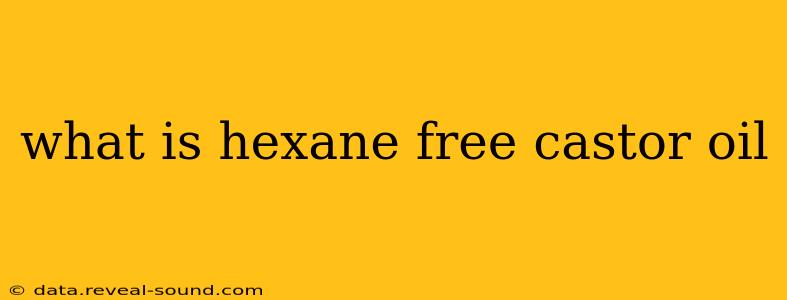Castor oil, derived from the seeds of the castor bean plant (Ricinus communis), is a viscous, yellowish liquid with numerous applications in cosmetics, pharmaceuticals, and industrial settings. However, the traditional method of extracting castor oil involves the use of hexane, a petroleum-derived solvent. This raises concerns for some consumers due to hexane's potential health and environmental impacts. Hexane-free castor oil is produced using alternative extraction methods that avoid the use of hexane, resulting in a product considered purer and safer by many.
Why is Hexane Used in Castor Oil Extraction?
Hexane is a powerful solvent that effectively dissolves the oil from the castor beans. Its use allows for efficient and cost-effective extraction on an industrial scale. However, hexane's volatility and potential for residual contamination are drawbacks. Traces of hexane remaining in the final product can pose health risks, prompting the rise in demand for hexane-free alternatives.
How is Hexane-Free Castor Oil Produced?
Hexane-free castor oil utilizes different extraction techniques that eliminate the need for hexane. These methods often involve:
-
Cold-Pressed Extraction: This traditional method involves pressing the castor beans to physically extract the oil. While less efficient than hexane extraction, it guarantees a hexane-free product.
-
Supercritical CO2 Extraction: This modern technique employs supercritical carbon dioxide (CO2) as a solvent. CO2 in its supercritical state possesses solvent properties without the toxicity of hexane. After extraction, the CO2 easily evaporates, leaving behind a pure oil. This method is more expensive but yields a high-quality, hexane-free product.
-
Other Solvent Extraction: Some manufacturers may use other solvents, such as ethanol or isopropyl alcohol, which are considered less harmful than hexane, although they are still solvents and might leave traces.
What are the Benefits of Using Hexane-Free Castor Oil?
Choosing hexane-free castor oil offers several advantages:
-
Purity: The absence of hexane ensures a purer product, free from potential contaminants.
-
Reduced Health Risks: Eliminates concerns about hexane exposure and its associated health risks, including potential neurological effects.
-
Environmental Friendliness: Hexane is a volatile organic compound (VOC) that contributes to air pollution. Hexane-free extraction methods are more environmentally sustainable.
-
Improved Quality (Potentially): Some argue that cold-pressed or supercritical CO2 extracted castor oil offers a superior quality with a richer aroma and potentially better skin absorption, although scientific evidence for this is limited.
Is Hexane-Free Castor Oil More Expensive?
Generally, yes. Hexane-free extraction methods are often less efficient and more costly than hexane-based extraction, leading to a higher price for the final product. The price difference reflects the commitment to purity and environmental sustainability.
What are the Potential Side Effects of Regular Castor Oil (With or Without Hexane)?
Even hexane-free castor oil can cause mild side effects in some individuals. These may include:
- Skin irritation: Some people experience redness or itching after applying castor oil to their skin.
- Allergic reactions: Rare cases of allergic reactions have been reported.
- Digestive upset: Ingesting castor oil can cause nausea, diarrhea, or abdominal cramps.
It's always best to perform a patch test before applying castor oil to large areas of skin and to discontinue use if any adverse reactions occur.
Where Can I Find Hexane-Free Castor Oil?
Hexane-free castor oil is increasingly available at health food stores, online retailers, and specialty shops that focus on natural and organic products. Always check the product label to ensure it explicitly states "hexane-free."
This detailed exploration of hexane-free castor oil should answer most of your questions and highlight the significant differences between traditional and hexane-free extraction methods. Remember to always read product labels carefully and choose a product that aligns with your personal preferences and health concerns.
